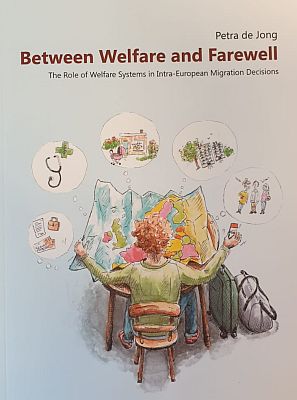Voorzieningen verzorgingsstaat geen magneet voor migratie binnen Europa

De meeste EU-migranten verhuizen naar een ander land tijdens levensfases waarin zij niet of nauwelijks afhankelijk zijn van de verzorgingsstaat. Er is dan ook weinig bewijs dat het niveau van sociale voorzieningen in het land van bestemming een belangrijke motivatie vormt voor migratie tussen Europese landen. Dat concludeert Petra de Jong in haar proefschrift Between Welfare and Farewell. The Role of Welfare Systems in Intra-European Migration Decisions .
Sociale rechten van EU-migranten, net zoals die van niet-migranten, worden doorgaans in de loop van de tijd opgebouwd en zijn daarmee afhankelijk van verblijfsduur en/of betaalde contributies. De Jong concludeert dat veel EU-migranten migreren in levensfases waarin zij weinig gebruik maken van de verzorgingsstaat en weer vertrekken voordat ze volledige rechten op sociale voorzieningen in het bestemmingsland hebben opgebouwd.
Haar bevindingen nuanceren het publieke debat in samenleving en politiek dat met het wegvallen van grensrestricties binnen de EU de druk op de verzorgingsstaat is toegenomen. De invloed van verzorgingsstaten op migratiebeslissingen blijkt veel complexer dan een algemeen ‘magneet’-effect en hangt samen met de (tijdelijke) rol van de verzorgingsstaat in de levens van individuen. Verzorgingsstaat-arrangementen lijken vooral van belang te zijn bij de migratiebeslissingen van kleine groepen van meer kwetsbare mensen, zoals gezinnen met kinderen en ouderen.
Verzorgingsstaat-arrangementen zijn dus op zichzelf geen belangrijke reden om te migreren. Sociale voorzieningen kunnen intra-Europese migratie echter wel mogelijk maken wanneer zij bescherming bieden tegen de onzekerheid en de risico’s die inherent zijn aan migreren. In afwezigheid van het vangnet dat een verzorgingsstaat biedt, bleken zelfs jonge, hoogopgeleide individuen minder bereid om te migreren, concludeert De Jong. Maatregelen die toegang tot sociale zekerheid voor EU-migranten beperken lijken daarom in strijd met de doelstellingen van de Europese Commissie om mobiliteit te versterken en het aantrekken van hoogopgeleide migranten in de vergrijzende Europese samenlevingen te stimuleren.
Inzicht in wie migreert en hoe de verzorgingsstaten in de landen van herkomst en bestemming de levens van deze individuen beïnvloeden, is belangrijker dan een focus op het aantal immigranten, stelt De Jong. Vooral de verzorgingsstaat-arrangementen in het land van verblijf beïnvloeden de migratiebeslissingen. Waar eerder onderzoek zich vooral richtte op een aantrekkende werking van de verzorgingsstaat in het bestemmingsland onderstreept het proefschrift van De Jong het belang van sociale voorzieningen in het land van herkomst.
Petra de Jong promoveert op 17 januari bij de Faculteit Ruimtelijke Wetenschappen
Meer nieuws
-
01 december 2025
De kracht van beweging


